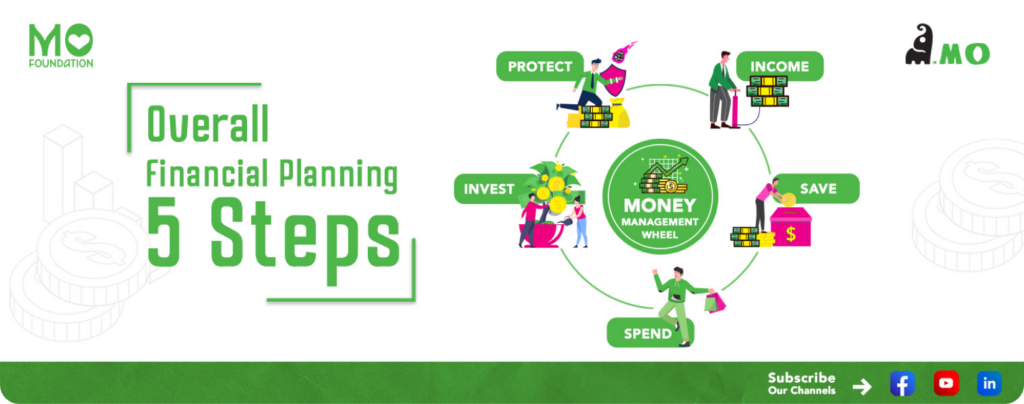
Overall financial planning for every individual provides the basics of money management: Income, Save, Spend, Invest, and Protect. The value of knowing all the basic steps of money management is to help all of us lay a stronger foundation from the start, and understand that these steps are actually intertwined and eventually will impact our money habits. Some hard-to-break habits could eventually lead to lifelong money struggles later in life.
These steps are not required to follow in order, but anyone who understands all of them will have a better foundation than those who don’t. In fact, these steps are widely known in many countries, even the U.S. Financial Literacy and Education Commission (FLEC) calls it “My Money Five”. It is part of the FLEC’s mission to provide sustained financial well-being for all individuals and families in the U.S. https://www.mymoney.gov/mymoneyfive
Our approach is simply different in the steps shown above, as we believe there is an easy and simple way to make sense of it, and we call it the “Money Wheel”.
As we all go through different stages of our financial life, we have to face moments that transcend each step of the “Money Wheel”. Just to summarize as follows:
Step 1 – INCOME: We need to make money to begin our financial planning journey.
Step 2 – SAVE: Once we have money inflows, we should aim to save first.
Step 3 – SPEND: We can then spend what’s left after we save
Step 4 – INVEST: We should invest the money we have saved to grow.
Step 5 – PROTECT: Protect ourselves, our family, assets, and finances by managing risks and having insurance.
It is easy to understand once we go through each step. However, you can jump steps depending on different financial circumstances. But please note that understanding all the steps will help us reduce the possible financial impacts in life. For example, if you only focus on investment, it is our advice to understand other aspects that could eventually impact your investment. Have you got your emergency funds? Have you settled your debts? Should you have your health protected? What if you had to liquidate your investment at a loss in order to cover the medical bills when you or your family members get sick without health insurance?
Let’s go through our guide for the “Money Wheel”, but we will delve into each step in our upcoming articles and video podcasts:
⦁ INCOME – Make the most of what you earn by finding more ways to increase existing and new money inflows. This would apply to both individuals and businesses. The concept of using money as a tool, and having it make more money when you sleep. What about our skill sets? How can we make use of our skills to create more income for ourselves?
⦁ SAVE – We usually do not know what to save for, and only for short-term objectives like saving to buy a phone, a car, or a short vacation. Do you know how to set all goals to ensure the security of your financial future? In this category, we also will share how you should arrange your accounts to ensure you build the discipline and good habits for your big financial goals and retirement.
⦁ SPEND – Be sure you are covered in all aspects of your daily spending, including: overspending issues that lead to debts, credit cards, debt management, bad debt – good debt, monthly budgeting, which tools are helping you stay in control of your spending.
⦁ INVEST – Basic 101 Investment knowledge to set the foundation for you to enter the investment world. Whether it is to invest in yourself, invest in others businesses, or pure investment to create passive income and build assets for yourself and families. Should you borrow to invest? When can you save for your first property? Or should you stay in a rental or buy a property? What are the current investment channels available to you?
⦁ PROTECT – It is about taking precautions about your financial situation, accumulate emergency savings, and have the right insurance. Furthermore, we also talk about risk management as many might fall into financial scams during this age of technology. Other protection would also ensure you never outlive your funds even after you have reached your financial goals. No one knows if we can live up to 85 or 100 years old. The only way to know is to understand what are the ways to
protect our money to ensure that the funds will not be depleted before we pass.
Money management could be complicated because this was not a topic being taught in school or at home, at least during the old times when we were growing up.
And it becomes more complicated because managing finances for ourselves, family and business could have some overlaps but also differences. We all go through many different life events like from being single to married to having kids. These will impose the changes we have in our financial life.
MO Foundation hopes this will empower you and your small businesses in handling money wisely, which will eventually lead to more confident and informed financial
decisions.